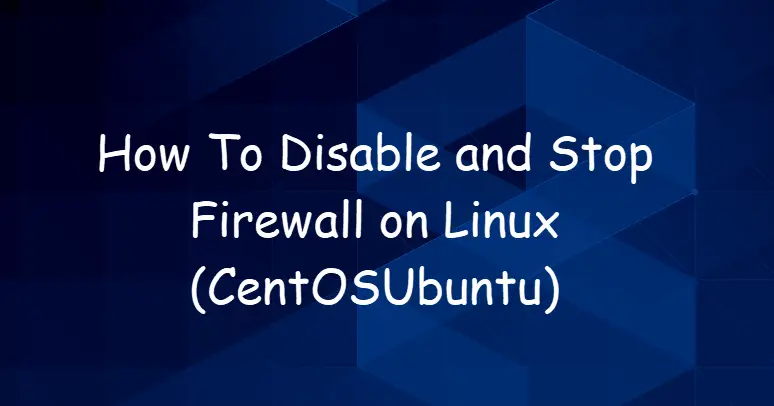How To Disable and Stop Firewall on Linux(CentOS/Ubuntu)
This post will guide you how to disable Firewall on your CentOS 7 or CentOS 8 or Ubuntu Linux system. How do I Stop Firewalld or UFW service on your CentOS or Ubuntu Linux from the command line.
- What is Firewalld
- What is UFW
- Checking Firewall Status
- Disabling Firewall
- Enabling Firewall
- Stopping Firewall

What is Firewalld
firewalld provides a dynamically managed firewall with support for network/firewall zones to define the trust level of network connections or interfaces. It has support for IPv4, IPv6 firewall settings and for ethernet bridges and has a separation of runtime and permanent configuration options. It also supports an interface for services or applications to add firewall rules directly.
What is UFW
UFW is used by Ubuntu and Debian Linux system for managing a netfilter firewall. This program is for managing a Linux firewall and aims to provide an easy to use interface for the user.
Checking Firewall Status
If you need to check the current status of the firewalld service or checking if a frewalld service is running or not in your CentOS or RHEL system, and you can use the following command:
$ sudo firewall-cmd --state
Or
$ systemctl status firewalld
outputs:
[devops@mydevops ~]$ sudo firewall-cmd --state running [devops@mydevops ~]$ systemctl status firewalld firewalld.service - firewalld - dynamic firewall daemon Loaded: loaded (/usr/lib/systemd/system/firewalld.service; enabled; vendor preset: enabled) Active: active (running) since Tue 2019-10-08 02:53:52 EDT; 6h ago Docs: man:firewalld(1) Main PID: 846 (firewalld) Tasks: 2 (limit: 8297) Memory: 31.0M CGroup: /system.slice/firewalld.service └─846 /usr/libexec/platform-python -s /usr/sbin/firewalld --nofork --nopid Oct 08 02:53:50 mydevops.com systemd[1]: Starting firewalld - dynamic firewall daemon... Oct 08 02:53:52 mydevops.com systemd[1]: Started firewalld - dynamic firewall daemon.
If you want to check if a UFW firewall is running or not on your Ubuntu or Debian based system, and you can use the following command:
$ sudo ufw status
Outputs:
devops@devops:~$ sudo ufw status
Status: active
Stopping Firewall
If you want to stop the firewalld service temporarily on your CentOS or RHEL Linux system, you can type the following command:
$ sudo systemctl stop firewalld
It is only valid for the current runtime session.
For Ubuntu or Debian Linux:
$ sudo ufw disable
Outputs:
devops@devops:~$ sudo ufw disable Firewall stopped and disabled on system startup
Disabling Firewall
If you want to disable the firewalld service or UFW in CentOS or Ubuntu system at boot time, you can use the following command:
$ sudo systemctl disable firewalld
or
$ sudo ufw disable
Outputs:
[devops@mydevops ~]$ sudo systemctl disable firewalld Removed /etc/systemd/system/multi-user.target.wants/firewalld.service. Removed /etc/systemd/system/dbus-org.fedoraproject.FirewallD1.service. [devops@mydevops ~]$ devops@devops:~$ sudo ufw disable Firewall stopped and disabled on system startup
Enabling Firewall
if you want to enable the Firewall service or UFw based firewall on your CentOS or Ubuntu Linux system, and you can type the following command at the shell prompt:
$ sudo systemctl enable firewalld
or
$ sudo ufw enable
Outputs:
[devops@mydevops ~]$ sudo systemctl enable firewalld Created symlink /etc/systemd/system/dbus-org.fedoraproject.FirewallD1.service → /usr/lib/systemd/system/firewalld.service. Created symlink /etc/systemd/system/multi-user.target.wants/firewalld.service → /usr/lib/systemd/system/firewalld.service. devops@devops:~$ sudo ufw enable Command may disrupt existing ssh connections. Proceed with operation (y|n)? y Firewall is active and enabled on system startup
Conclusion
You should know that how to stop and disable the firewalld service or UFW based firewall in your CentOS or RHEL or Ubuntu Linux system.
